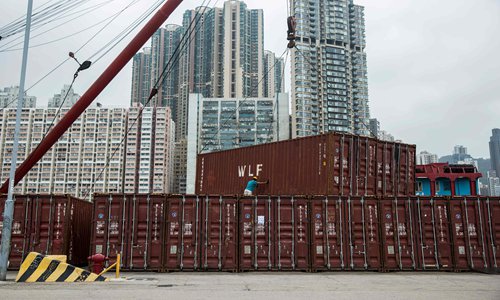HOME >> BUSINESS
HK seeks opportunities in Greater Bay Area amid trade pressure, riots
By Chen Qingqing and Song Lin Source:Global Times Published: 2019/9/22 22:33:40
Regional efforts can enhance city’s role as global hub

A worker assists shipping containers as they are stacked on a pier in Hong Kong in October 2018. Photo: VCG
Hong Kong, as a global trade hub, has been suffering from the ongoing trade war between China and the US as well as the ongoing unrest in the region, as it saw its exports drop for nine consecutive months. Hong Kong authorities and business representatives aim to increase logistics efficiency while accelerating integration into the Guangdong-Hong Kong-Macao Greater Bay Area to deal with external pressure and uncertainties.
The city's exports dropped 9 percent in June and 5.7 percent in July, and the situation has been worsening as the unemployment rate in the trade sector has risen from 1.9 percent at the beginning of the year to 2.4 percent during June-August period, Hong Kong Financial Secretary Paul Chan Mo-po, said in an article published on Sunday.
"The external and macro situations are hard to control, but we could initially enhance our competitiveness by embedding more innovation and new technologies to increase business, logistics and transport efficiency," Chan said, noting that this effort would help maintain long-term advantages for Hong Kong as a global shipping and trade hub.
In 2018, Hong Kong's total goods exports amounted to HK$4.16 trillion ($530 billion) while imports of goods totaled HK$4.72 trillion, according to official data.
The external trade sector, combined with wholesale and retail trade, accounted for 21.5 percent of total GDP in 2017.
As an externally oriented economy, Hong Kong has been actively working with cities in the Greater Bay Area, which will further enhance its position as an international transport and trade center, analysts said.
"We'll build a high-level logistics center in the Hong Kong International Airport, which will be the third-largest logistics warehouse in Hong Kong, and it's expected to operate by 2023," Chan said, noting that the authority is also studying an airmail center at the airport and introducing advanced equipment to increase its efficiency.
More importantly, Hong Kong has been working actively with customs offices in cities in the Bay area, including Zhuhai, South China's Guangdong Province, he noted.
"Big data and artificial intelligence technologies, where we cooperate with Zhuhai online customs to analyze logistical information and enhance clearance efficiency, will help small and medium-sized enterprises to grab opportunities under the Belt and Road Initiative (BRI)," Chan said.
More opportunities
Ongoing unrest in Hong Kong has dampened its business prospects, particularly after radical protesters targeted major transport hubs and paralyzed the Hong Kong airport, hurting its reputation as a solid business hub.
The unrest has had a negative impact on cooperation between enterprises from Hong Kong and the Chinese mainland, Su Jinzhan, president of Shenzhen Risheng Ecological Tech, a landscaping high-technology company, told the Global Times.
But the impact will pass, Su noted, adding that Hong Kong-based enterprises, with a better acknowledge of overseas markets, could act as a bridge to connect and help mainland companies go abroad.
Trade between the mainland and Hong Kong accounted for 6.7 percent of the mainland's total external-oriented trade in 2018, and Hong Kong remained the mainland's sixth-largest trading partner and fourth-largest export destination.
Zhuang Rui, deputy dean of the University of International Business and Economics' Institute of International Economics in Beijing, said that Hong Kong's plunging exports don't just reflect the China-US trade war but also the industrial upgrading of China.
In addition, continuous unrest has damaged security expectations toward Hong Kong, as well as its aviation and business operations. These factors will increase downward pressure on Hong Kong's exports, Zhuang said.
Given this situation, increasing cooperation with the mainland will create new economic momentum for Hong Kong and regional synergies.
"Especially under the framework of the BRI, Hong Kong needs to grasp the great opportunity and act as a bridge for trade and investment between the mainland and countries and regions involved in the BRI," Zhuang said.
Hong Kong enterprises possess advanced professional services that can complement the mainland's advantages in investments in BRI countries, Zhuang said - for example, an investment project in Nepal that survived a violent earthquake, which was supervised by a Hong Kong enterprise.
The overall premise of economic and trade growth is Hong Kong maintaining the rule of law, Zhuang noted.
Newspaper headline: HK grapples with trade pressure
Posted in: ECONOMY